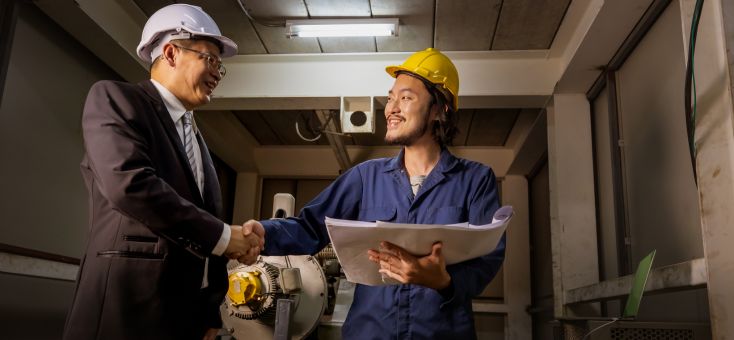If you’ve explored the job market in recent months, you might have stumbled upon some novel terms that weren’t as prominent in the past. Among them are ‘skills-based economy’ and ‘skills-based hiring’.
For mid-careerists, you could be wondering what this means for all the experience you’ve gained. Have all the years you’ve spent building a portfolio of professional achievements been rendered obsolete?
Don’t panic. We’re here to guide you through the nuanced relationship between experience and skills in shaping your career trajectory in the current employment landscape.
Looking for a new role? Explore over 100,000 jobs available on MyCareersFuture now!
Why is Singapore moving towards a skills-based economy?

The World Economic Forum defines a skill-based economy as an economic environment where skills are important for production and business competitiveness. Singapore’s transition from a knowledge-based economy to a skills-based economy has been a deliberate and ongoing process. Minister for Education Chan Chun Sing said:
“If the half-life of skills and knowledge has shrunk, then it must follow that the pace of acquiring skills and new knowledge must intensify.”
He highlighted that the definition of success for Singapore’s education system cannot be defined by just how well it produces a cohort of 30,000 to 40,000 students each year for the job market. “It should be how well we do that plus retraining and upgrading about half a million adult learners each year,” said Minister Chan.
While Singapore has long prioritised education and innovation as pillars of its economic development strategy, the focus has evolved to emphasise the acquisition and application of specific skills and competencies within the workforce due to necessity.
Emergence of COVID-19
As some sectors were hit hard and new sectors emerged amid the pandemic, there was a significant shift in the jobs market. Companies in growth sectors such as e-commerce, biotech, and logistics found it challenging to fill newly created roles, due to the stark skills gap in the workforce. This phenomenon triggered a major shift in traditional mindsets towards hiring.
AI, automation, and the future of work
As the world of work evolves to embrace technology, automation, artificial intelligence (AI) and other advancements, Singapore recognises the imperative of equipping its workforce with the necessary skills to thrive in this digital age.
These technological advancements have reshaped industries and job roles, creating a growing demand for workers with technical skills, adaptability, critical thinking, and problem-solving abilities.
Is work experience still relevant in the skills-based economy?

While experience and skills hold value, the relative importance of each can vary depending on the industry, job role, and individual circumstances.
Experience, often gained through years of working in a particular field or role, offers valuable insights, industry knowledge, and a proven track record of success. Employers may prioritise candidates with extensive experience, especially for leadership positions or roles that require specialised expertise and industry-specific knowledge.
Additionally, experience fosters resilience, adaptability, and the ability to navigate complex situations, which are essential qualities for career advancement.
On the other hand, skills play a crucial role in today’s rapidly evolving job market. With technological advancements and changing industry landscapes. Employers are increasingly seeking candidates with a diverse set of skills, including technical skills, soft skills, and transferable skills.
In Singapore’s skills-based economy, individuals with relevant and up-to-date skills are better equipped to adapt to new challenges, seize opportunities, and remain competitive in the job market.
Where can I get help to upskill? Is the government helping workers like me make the shift?

As Singapore shifts towards a skills-based economy, the government has intensified its efforts to foster a culture of lifelong learning and skills mastery. Through initiatives like SkillsFuture, Singapore workers are empowered to continuously upskill and reskill to remain relevant in an ever-changing job market. Speaking at the ST-Budget Roundtable, the second minister for finance, Indranee Rajah said:
“…The reason is that the pace of change has been accelerating. Digitalisation, new growth areas like sustainability and artificial intelligence (AI)… these are things that employers and employees have to grapple with, and hence the need to upskill, learn new skills – diverse skills – has accelerated.”
Below are some of the key initiatives that have been rolled out to help Singapore workers make a successful mid-career switch into sunrise industries:
Mid-Career Pathways Programme
For mid-career individuals who desire to gain new, in-demand skills through industry-relevant attachment programmes lasting up to six months with approved host organisations.
Career Conversion Programmes (CCP)
For mid-career individuals who desire to undergo skills conversion and move into new occupations or sectors that have good prospects and opportunities for progression. WSG offers about 100 CCPs to support mid-career individuals in career conversion.
SkillsFuture Level-Up Programme
A newly introduced programme that seeks to support workers aged 40 and above in undertaking significant reskilling and upskilling to boost their prospects in their current job, or to pivot to a new career.
- From 1 May 2024, a SkillsFuture Credit (Mid-Career) top-up of $4,000, to further offset out-of-pocket course fees for selected courses that have better employability outcomes
- Currently, Singaporeans qualify for the Mid-Career Enhanced Subsidy (MCES) which covers up to 90% of the fees for courses funded by SkillsFuture Singapore and at least 90% of the programme cost for Ministry of Education-funded courses
- From Academic Year 2025, Singaporeans can receive subsidies for another publicly-funded full-time diploma, and qualify for the MCES.















